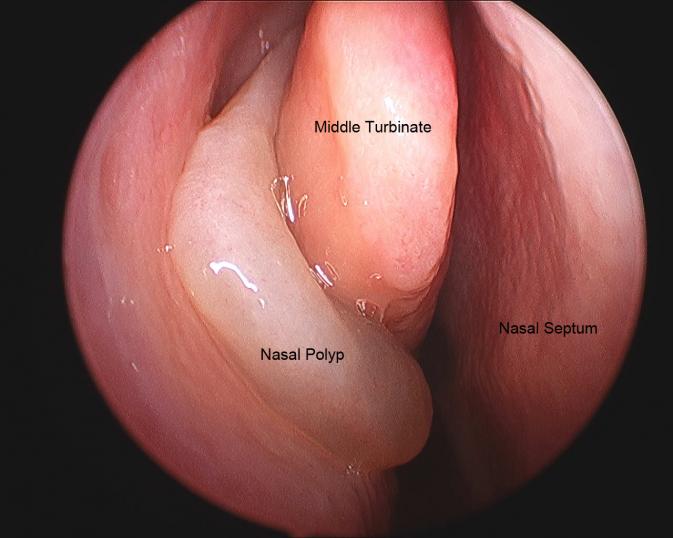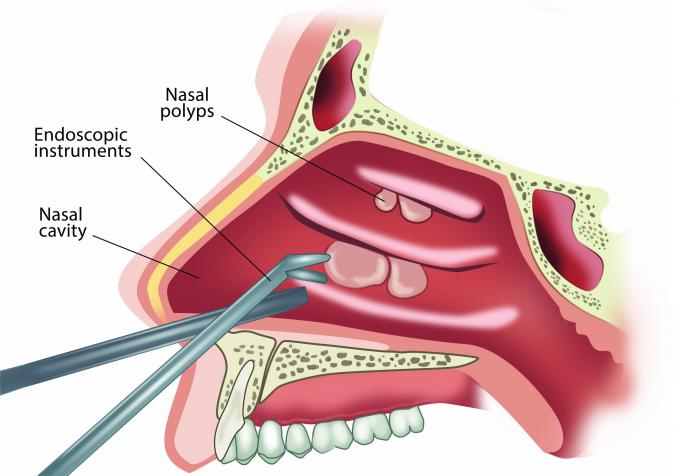
Nasal polyps are soft, painless and non-cancerous growths that develop in the sinuses and eventually also in the nose due to an inflammation of the mucosa. Chronic sinusitis can exist with or without nasal polyps. It is still unclear why some patients develop nasal polyps and others do not.
Nasal polyps may not cause any symptoms, especially if they are small. However, larger ones can block the normal drainage of the sinuses, resulting in the accumulation of mucus, which makes sinuses more easily infected. In addition, chronic rhinosinusitis with nasal polyps causes an inflammation of the olfactory (smell) mucosa that leads to a reduced sense of smell.
The goal of nasal polyps treatment is to reduce the inflammation that causes the polyps. When the inflammation is reduced the polyps become smaller or sometimes even disappear. If polyps do not sufficiently shrink or disappear surgery may be necessary. The use of medication represents the first-line treatment, and surgery (=polyps removal) is recommended as the second-line treatment.
Nasal corticosteroids: Corticosteroid nasal sprays are generally prescribed to reduce inflammation. This treatment may shrink the polyps or eliminate them.
Oral corticosteroids: If a nasal corticosteroid is not effective, an oral corticosteroid may be prescribed. Because oral corticosteroids can cause serious side effects, they are generally taken only for a limited period of time.
Antibiotics: Antibiotics may be prescribed in case of chronic and recurring infection of your sinuses. Some antibiotics also have anti-inflammatory properties which may reduce the inflammation of your sinuses as well as the size of the polyps.
Antihistamines: If you suffer from allergies, antihistamines may be prescribed to help reduce the allergic inflammation of your sinuses and nose.
Biologicals: Biological drugs are promising novel treatments (new molecules) currently being tested to reduce the size of nasal polyps in patients with chronic rhinosinusitis.

The standard procedure to remove nasal polyps is Functional Endoscopic Sinus Surgery (FESS). The surgeon will insert a small tube with a tiny camera into the nostrils and guide it into the sinus cavities and the polyps will be removed. During the operation, the surgeon may also remove the disease in additional key areas in order to restore adequate aeration and drainage of the sinuses. Endoscopic surgery is usually performed as an outpatient procedure.
Note that even after surgical removal of the nasal polyps, the inflammation may still remain. Therefore, to improve your smell it is important to continue your medications because they reduce the inflammation of the olfactory mucosa.
Why do nasal polyps grow back after surgery?
Chronic rhinosinusitis with nasal polyps is a chronic disease. This condition will need constant treatment with corticosteroids to prevent the worsening of the symptoms. Unfortunately, in some cases, even the nasal sprays with corticosteroids are not strong enough to suppress polyp growth.
Chronic (rhino)sinusitis can present with or without nasal polyps and currently, it is still unclear why some patients develop nasal polyps and others do not. The main characteristic of nasal polyps is the large quantity of fluid in between the cells of the sinuses (oedema) with the presence of inflammatory cells inside this fluid. Among the inflammatory cells, eosinophils are prominent in about 80% of Caucasian polyps associated. In non-Caucasian polyps as well as in polyps from patients with cystic fibrosis, increased numbers of neutrophils (another type of inflammatory cells) are observed, which is also detected in patients suffering from chronic (rhino)sinusitis without nasal polyps.
Classical nasal polyps that are seen in conjunction with chronic (rhino)sinusitis do not develop into malignant tumours. However, other types of polyp-like structures can be present in the nasal cavity that might be or turn into malignant tumours. Therefore, it is of the utmost importance that nasal polyps are adequately examined and followed up by means of nasal endoscopy and if necessary, by different types of scans. Extra vigilance is needed in case of one-sided symptoms, nasal bleedings, deformations of the face and severe pain.
Nasal polyps may not cause any symptoms, especially if they are small. However, larger ones can block the normal drainage of the sinuses, resulting in the accumulation of mucus, which makes sinuses more easily infected. In addition, chronic rhinosinusitis with nasal polyps causes an inflammation of the olfactory (smell) mucosa that leads to a reduced sense of smell.
The swollen lining of the nasal and sinus mucosa and nasal polyps can cause nasal obstruction. Also, mucus and crusts can cause obstruction. If this is the case, nasal rinsing with saline can improve your breathing.
Rhinitis (inflammation inside the nose), sinusitis (inflammation inside the sinuses) and asthma (inflammation inside the lungs and respiratory tracts) are conditions that often coexist and can make each other worse. The nose is the air conditioner of the body and when you breathe through your nose the air is humidified and cleaned. Nasal obstruction leads to mouth breathing and the reduction of this important air conditioning function.
When you smell a flower, particles are inhaled into the upper part of the nose and bind with the receptor cells on the olfactory (smell) mucosa high in the nose. Chronic (rhino)sinusitis, especially with nasal polyps, causes an inflammatory response of the olfactory (smell) mucosa that leads to a reduced sense of smell. In patients with severe nasal polyps, the polyps themselves also block the olfactory (smell) mucosa making it difficult for odours to reach that area.
Chronic (rhino)sinusitis, especially with nasal polyps, causes inflammation of the olfactory (smell) mucosa that leads to a reduced sense of smell. Although after surgery the nasal polyps that block the olfactory (smell) mucosa have been removed, the inflammation will remain. To improve your smell, it is important to continue to use nasal sprays containing corticosteroids every day because they reduce the inflammation of the olfactory (smell) mucosa. When this is not sufficient, sometimes corticosteroid tablets like prednisolone or Celestone (betamethasone) can improve the sense of smell, but they can only be used for a limited period.
Both medical and surgical treatment aims to reduce the inflammation in sinuses caused by (rhino)sinusitis. Nasal sprays containing corticosteroids or corticosteroid tablets can usually clear this up and restore your sense of smell. If the medical treatment fails, sinus surgery may be considered. However, it is challenging to predict improvement following the surgery. Some evidence supports the positive impact of sinus surgery on improving the loss of smell. However, if you stop taking your nasal medications after surgery, the reduced smell is likely to return.
Having a sense of smell will also enhance your ability to taste. Tiny particles from our food travel into the nasal cavity via the passage that connects it to the back of our throat while we are eating. A person with a fully functioning sense of smell can partially test this by eating food while pinching their nose shut to see how important smell is to the sensory experience.
The mechanism of smell impairment in patients with chronic (rhino)sinusitis is not primarily a physical obstruction from swollen mucosa and polyps but more a chronic inflammation of the olfactory (smell) mucosa. For that reason, nasal sprays containing corticosteroids that reduce inflammation can often improve or restore your sense of smell. However, if there is already damage to the olfactory (smell) mucosa, the return of the sense of smell to a normal state might not be possible.